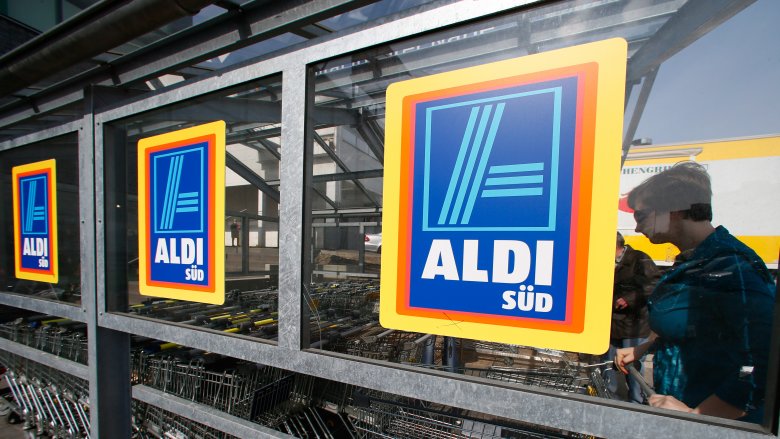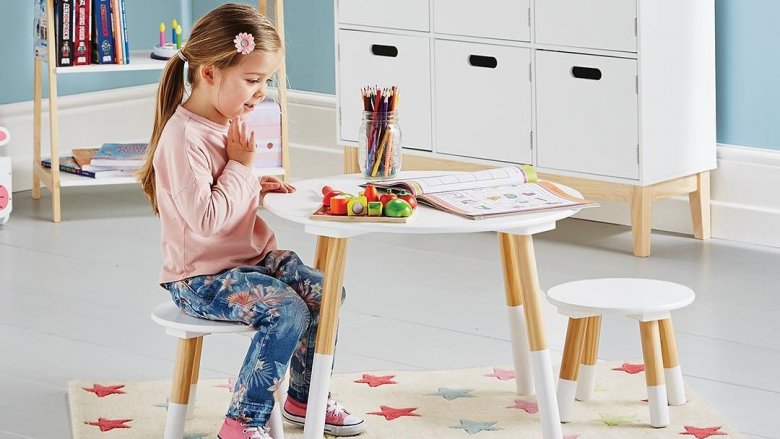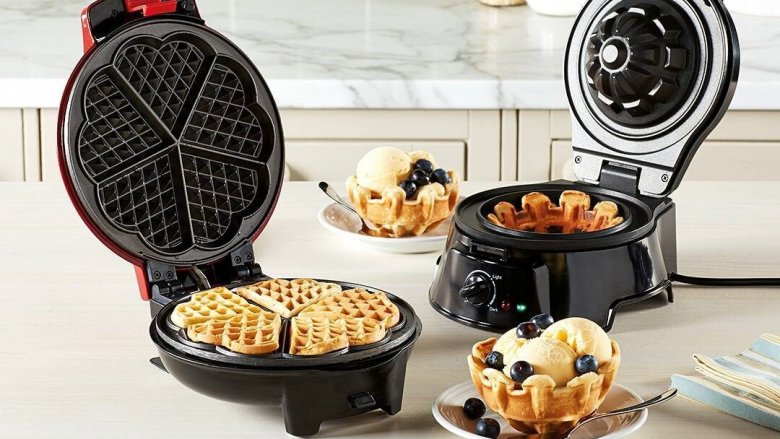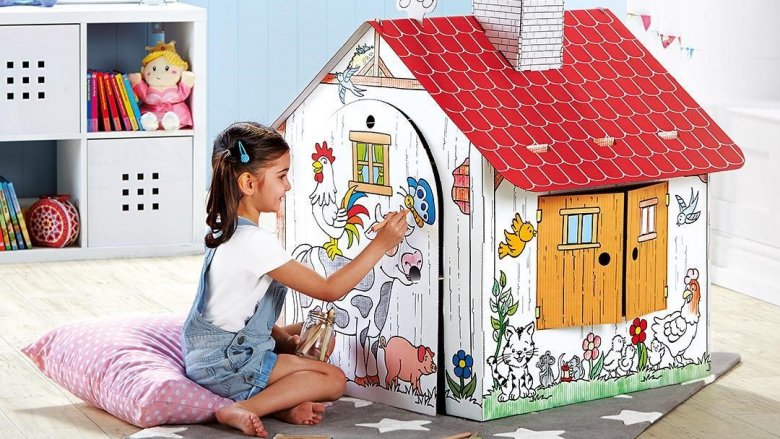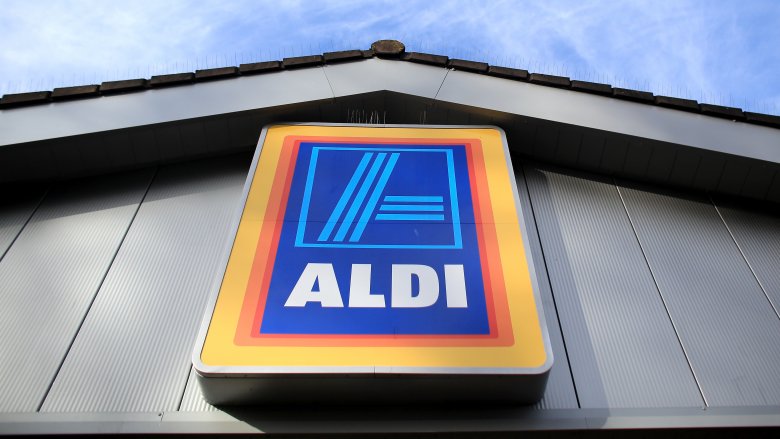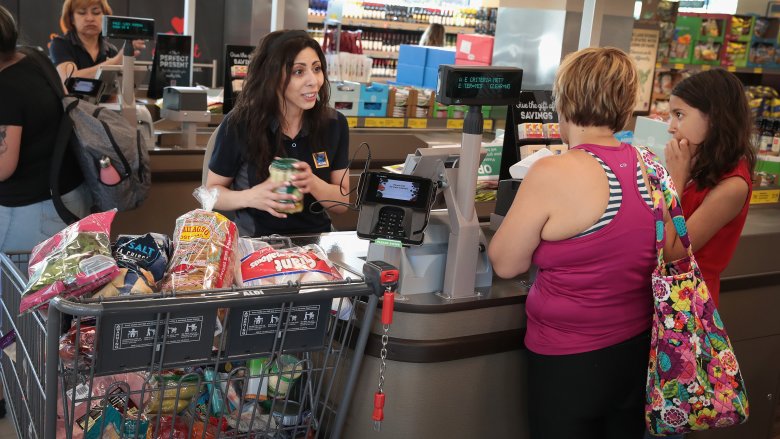What You Need To Know About Aldi's Special Buys
There are two types of people in the world: There are the kind that religiously follow Aldi's updates and newsletters, scour the ads, figure out exactly what they want, and plan on being there when the doors open for first strike. Then, there are the people who just sort of show up, not knowing what they're going to find, and setting out on a treasure hunt when they get there. If you've ever gone to Aldi for some chocolate and wine but walked out with a hammock, some floor mats, a box of tools, and two dozen color-change night lights, you're probably the latter.
Either way, you can't deny their Special Buys are pretty appropriately named. While you never know what you're going to find popping up in-store next, you do know it's going to be a good deal. (You also know when you're going to inexplicably be compelled to buy 25 extension cords, because hey, you never know when you're going to need those.)
So, what's going on here? How do they find all these great deals, how do they pass them on to you, and what's the trick to making sure you get what you want? Let's talk about some Aldi inside information.
They're based on opportunistic buying
Aldi cuts their costs in an almost insane number of ways, and all that savings gets passed on to the customer. But they're still a pretty secretive bunch, and that makes it tough to get a really good look at everything going on behind-the-scenes. We do know some things, though, and that includes how they decide on their Special Buys.
Retail Doctor's Brian Walker says (via News.com.au) Aldi's 2003 push into Australia succeeded largely because of their low prices and those Special Buys. They keep people coming back to see what's on special for the week, and he says most of the products are oversupply from various organizations and suppliers. Aldi buyers get approached by companies looking to offload a ton of product at bulk and bargain prices, that then get passed on to the customer.
Walker calls it "opportunistic buying", and it basically means that since they're not locked into needing to buy something, they can make purchases when it's a good deal for them. They also have the weight — and finances — of a global corporation behind them, plenty of reach when it comes to unloading product, and worldwide suppliers to get stock from.
Aldipreneurs are a thing
Most people love Aldi's Special Buys because they're typically good products at ridiculously low prices, and that's what makes this sub-market super weird. Some of those people shoving their way to the front of the line and grabbing some of the biggest, hottest deals aren't just getting it for themselves, they're getting it to resell for a hefty profit.
They're called Aldipreneurs (via AOL), and they usually resell Aldi finds on various auction sites online. You can see where determined shoppers might make a few bucks marking things up and selling them to people who missed out but still want a good deal, but here's where it gets bizarre.
Aldi Special Buys might be marked up two, three, four times their original price, making them not quite the incredible deal they originally were. Let's take a 2016 deal on onesies. They were on sale for $11.99, they were adorable, and Moms wanted them. A lot. They triggered a massive scramble and people literally filled shopping carts with them. Later, the moms of Mumcentral reported they were popping up on eBay — with a starting bid of $200. The same thing happened in 2017, when Pretty 52 reported Aldi UK's £3.99 candles (pictured) started showing up on eBay for £29.99 starting bids. What?
Don't call it limited
We all know that once Aldi Special Buys are gone, they're gone. That's sad, but look at it this way: there's more on the way.
According to Tom Daunt, CEO of Aldi Australia (via News.com.au), they have a term for that — and it's not "limited." He says they never, ever call it that, "... because you can pretty much buy everything you need as a grocery shopper."
Instead, they call it "focused." There are a few things at work here, too. The quantities of items are chosen for a specific reason — they stock enough to keep things on the shelf for an estimated two-week period. That gives customers time to come in, get what they want (for the most part), and swing back again if they have a little bit of buyer's regret about not picking up more of items that are going to disappear and not be restocked. It also means that as Aldi stores cycle through the space allotted to their Special Buys, there's minimal turnover and minimal stock leftover by the time they need to set up for the next round of special deals.
The weird and wacky stuff
One of the ways Aldi saves money and keeps their prices low is by stocking fewer core items than their competitors. Typically, Aldi has around 1,400 core items, and those are the basics that are always on the shelves. Compare that to chains like Wegmans and Kroger, who have an average of 30,000 core items. That's a lot less inventory and less money tied up in shelf stock, so where do Special Buys fit into that?
CEO of Aldi Australia Tom Daunt says (via News.com.au) that every year, they have between 3,500 and 4,000 items go through their Special Buys program. That's more than twice the number of products they stock on a regular basis, so there are a ton of new things showing up all the time. Part is food, but part is what Daunt calls "the weird and wacky stuff." The benefit of this business plan is huge: they're getting good deals and reselling them, sure, but they're also keeping people coming in the door pretty regularly to see what's new.
It's carefully planned out
Aldi's Special Buys aren't completely arbitrary, even though it might seem that way. Tom Daunt, CEO of Aldi Australia, says (via News.com.au) it's Aldi's buying department that's in charge of not just finding these great deals, but of keeping track of what's selling well, what's in demand during that particular time of the year, and what market trends say people want. There's no limit to the categories they look at, either, and that's why you might find baby clothes on the shelf next to bags of compost.
"We don't sell everything, obviously, but if we look into hardware for example, and we notice that particular products and categories are selling well, we'll go out to the market and say, 'Can we buy that, can we get a better quality, and potentially get it onto the shop floor for a much lower price?' Where we can answer that question positively, you'll find it here."
There have been issues with stock
Even if you show up on the first day Aldi stocks a new group of Special Buys, you still might miss out. Some are so insanely popular that they literally sell out in seconds, and that's no joke. Some items cause a Black Friday-style panic, and it happens more than you might expect.
In September 2017, The Chronicle says Aldi Australia stocked a grey fabric armchair for $99. Doesn't sound like anything extraordinary, right? People lined up pre-opening, and the chair sold out in Australia almost immediately — mostly because there were so few in stock. In Sydney, the six chairs lasted about 20 seconds. Later that same month, Australian customers were queuing again for a kids' ride-on Mercedes and tractor, and with only a few for each store, they were almost immediately gone. In December, it was a Dyson vacuum cleaner that brought the lines of hopeful people, and an average sell-out time of 30 seconds. And the next month, it happened yet again with a $199 rocking armchair. Were people upset? Absolutely.
They've been accused of bait advertising
Just how fast some Special Buys sell out is potentially problematic not just for customers, but for Aldi. The Checkout is an Australian television program that investigates all kinds of consumer affairs, and they did some digging into just how much stock Aldi stores actually got of some of their biggest Special Buys. When they found it's not unusual for stores to stock only a few units of some of the best and biggest deals — like those $199 rocking armchairs — they questioned the legality of it.
They say it's called "bait advertising," and it's basically the practice of advertising awesome deals on extremely limited stock just to get people in the door. Aldi notes on all their advertising the stocks vary and will sell out, a disclaimer that should allow them to avoid legal action. But The Gladstone Observer says according to Australian law and the Australian Competition and Consumer Commission, stores can only advertise "goods in quantities that are reasonable ... and they shouldn't advertise if there are reasonable grounds for believing that the business will not be able to offer those goods for a period that is reasonable." Will that get them in trouble? Time will tell.
It gets strange
Sure, you never know what you're going to find included in Aldi's Special Buys and sure, you expect to see some strange things there. But sometimes, there's super strange things there. How strange? There's even a Twitter account dedicated to documenting the weirdest products on Aldi's shelves, and it's @aldi_otw. They've posted photos of everything from 3D printers to garden showers, meat slicers, and garden sheds made especially for bicycles. Like the idea of a bike, but feel there's too many wheels? They've stocked unicycles, too.
News.com.au has reported on some of the stranger things they've seen, and it includes things like wine fridges, inflatable television sets, craft brew kits, and marine safety kits. But one of the weirdest things Aldi has ever stocked also caused the most chaos. In 2017, Aldi Ireland stocked an inflatable hot tub. Big enough for four people, it came with 120 air jets, a 2,200W heater, and cost just €399.99, or a little over $400. It's not surprising they flew out of stores, and it's also not surprising Evoke reported in 2018 that they were back in stores in the months before summer.
They've had a few controversies
Aside from Special Buys that sell out ridiculously fast, there have been a few controversies over the products themselves. In 2017, Aldi added some Green Action Flushable Bathroom Cleaning Wipes to their Special Buys shelves, and according to Nova 96.9, people were outraged. Even though they were labeled as "flushable," countless customers took to social media to point out they didn't break down, could potentially destroy plumbing, and were terrible for the environment.
Also in 2017, Tenplay Eyewitness News reported on another product that caused some people to pick up their figurative pitchforks in protest: the bestselling book The Boy in the Dress. The book — written by British comedian, presenter, and activist David Walliams — was condemned for introducing transgender issues in a children's' book. Not everyone was upset, though, and while customers condemned or lauded the book and Aldi, Aldi had this to say: "With ALDI's unique range of Special Buys, there is often a range of feedback. We have no intention of removing The Boy in the Dress from sale, the book tells the story of freedom of expression and tolerance."
How to get what you're looking for
If you don't want to miss out on anything, how do you make sure you know exactly what Aldi is going to be stocking and when it's going to go on sale? That depends on what country you're in. For US shoppers, Aldi uploads their weekly ads to their web site, and you can look ahead to see what's coming up. Oftentimes, Special Buy weeks are themed, so if it seems like there's a lot of gardening goods in the ad, chances are good you might find even more variety on the shelves. You can also subscribe to their mailing list, and get updates that way.
Now, prepare to be at least a little bit jealous. Aldi looks a little different in every country, since they cater their business plans to each specific market. In the UK, Aldi shoppers can order Special Buys online, and seriously, why is this option not available everywhere? It definitely makes it much easier to guarantee you're not going to miss out on the latest fitness gear, $199 laptops, and nifty kitchen gadgets, but outside the UK? You're just going to have to check out the ads and get there early.
